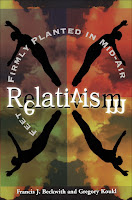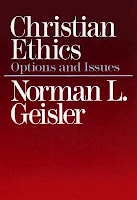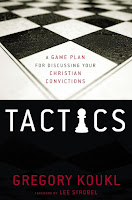God's Existence, Science and Faith, Suffering and Evil, Jesus' Resurrection, and Book Reviews
Showing posts with label Separation of Church and State. Show all posts
Showing posts with label Separation of Church and State. Show all posts
📚 Top 5 Books For Ethics and Politics 🗽
Common Questions and Challenges in Political Discussions
- Who are you to judge someone else?
- Who's ethical system are we to abide by (if anyone's)?
- Isn't it wrong to legislate a specific morality?
- Isn't morality relative to each individual, anyway?
Top 5 Books for Discussing Ethics and Politics
- Relativism: Feet Firmly Planted in Mid-Air- Greg Koukl and Francis Beckwith
- Christian Ethics: Options and Issues- Norman Geisler
- Legislating Morality: Is It Wise, Is It Legal, Is It Possible- Norman Geisler and Frank Turek
- The Case For Life- Scott Klusendorf
- Tactics: A Gameplan for Discussion Your Christian Convictions- Greg Koukl
Why Did I Choose These Books?
Relativism: Feet Firmly Planted in Mid-Air
In any discussion about ethics and politics, a foundation needs to be established. That foundation begins with whether or not morality is objective or relative. If relative, discussions are reduced to mere opinion. If objective, then there is a correct ethic and application in politics to be discovered, and discussion involves the defense of particular views. Greg Koukl and Frank Beckwith take everyday situations and show how relative morality cannot possibly be correct. It is philosophically deep yet written in an easy-to-digest style (its not boring). This book sets the foundation for discussing ethics and politics and helps the reader to defend objective morality in these discussions.
Christian Ethics: Options and Issues
Political discussions do not always take place between two people of completely divergent worldviews; many times they are between two of the same worldview. Many Christians believe different ethical systems that they have derived from the pages of the Bible. These systems result in different applications in everyday life and in politics, so it is important that Christians understand which ethical view makes the most consistent sense of the most biblical data. Norman Geisler examines different ethical views that Christians have proposed in history and compares them to the biblical data; he provides a philosophical critique of the various views; and defends the view he believes is the accurate view. This book made my list because it guides the reader through defending the proper view, which will help defend particular ethical and political views from a logical and biblical perspective.
Legislating Morality: Is It Wise, Is It Legal, Is It Possible
In political discussions it is common to hear an objector say that morality should not be legislated because it is not wise, legal, or even possible. Norman Geisler and Frank Turek take the reader through the philosophical foundations for the founding documents of the United States of America. They also examine the logical fallacies involved with the claims that morality cannot and should not be legislated. They also spend a large portion of the book describing a model for determining what morality should be legislated and what morality should not be legislated. And how this model plays out in various hot political topics is presented. If you engage in or just listen to discussions on politics, this book needs to be read. It will help provide a powerful context for analysis and discussion of ethical and political positions.
The Case For Life
One of the big ethical and political issues of today is the topic of abortion. Discussions of abortion are often emotionally heated and rarely go anywhere because of the usual lack of a persuasive case by either side. Scott Klusendorf takes a commonly accepted source for truth that both sides acknowledge: science. He presents a powerful positive case that the unborn are unique, alive, and human. He scientifically and philosophically critiques the most common and more philosophically rigorous pro-choice arguments. He presents them in a way that is easy to understand and present in everyday discussions. This book is indispensable for the pro-life defender to present a scientifically focused case to those who value the findings of the scientific disciplines.
Tactics: A Gameplan for Discussion Your Christian Convictions
Finally, just possessing all the knowledge from the above books will not necessarily make conversations on ethics and politics productive. The person who wishes to persuade others in conversation must present their case in a winsome, respectful, and calm manner. Greg Koukl's book "Tactics" takes the reader through several different principles and real-life conversations to show how to intentionally discuss controversial issues in a non-combative posture. While this book is the last one listed, it could easily be the first one on the list that I recommend you read. You will be able to apply its principles throughout the time that you are reading through the other books and the books in any other Top 5 list.
Related Posts: Conducting Controversial Conversations
Related Posts: Ethics and Politics
Book Review: Legislating Morality- Is It Wise, Is It Legal, Is It Possible
Introduction
Legislating Morality: Is It Wise, Is It Legal, Is It Possible by Norman Geisler and Frank Turek has been on my reading list for quite some time. It is often brought up by skeptics that Christians do not have a consistent view of morality, especially when it comes to government. This is often used as evidence of internal inconsistency within the Christian worldview and often leads to the conclusion that Christianity is false. And with the political season upon us yet again, I have been involved in many discussions about morality and politics. When defending the existence of God by using the moral argument, it is important to recognize the difference between moral ontology and moral epistemology (does objective morality exist vs. which objective morality exists) to address the claim of an internal inconsistency; however, we cannot stop there. Often the challenge comes from a genuine concern about the consistency of the moral code that Christians say is objectively established by the God of the Bible. So, it is important that defenders of the Christian worldview educate themselves on views of morality, and in political seasons, the morality of legislating morality.A few weeks ago I decided to put reading two other books on hold and go through this one to better prepare myself as these discussions become more and more common with the season. Was I disappointed with that decision? I will give this book my usual chapter-by-chapter summary treatment then provide my recommendations at the end.
Politics and Foundations
 The other day I was in conversation with a friend who is quite involved in the political scene over here in The States. Every now and then she will forward me the latest "evidence" pointing toward the corruption of government in general. However, she had made a religious claim that she based on subjective evidence. I had asked her to support the assertion in a way that might be compelling to someone else. She not only offered the subjective evidence, but claimed that it was up to the other person to prove her point of view incorrect, then she topped it off with, "That is my opinion".
The other day I was in conversation with a friend who is quite involved in the political scene over here in The States. Every now and then she will forward me the latest "evidence" pointing toward the corruption of government in general. However, she had made a religious claim that she based on subjective evidence. I had asked her to support the assertion in a way that might be compelling to someone else. She not only offered the subjective evidence, but claimed that it was up to the other person to prove her point of view incorrect, then she topped it off with, "That is my opinion".
Find other posts related to:
Arguments, Foundations, opinion, Politics, Relativism, Separation of Church and State, truth
Subscribe to:
Comments (Atom)








